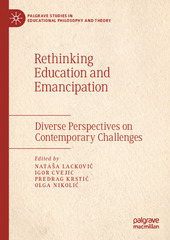Приказ основних података о документу
Ways and Sideways of Emancipation: Dewey’s Reception in Different Political Eras of an Other-Than-Western Context
| dc.creator | Sekulović, Milica | |
| dc.creator | Ilić Rajković, Aleksandra | |
| dc.date.accessioned | 2024-04-03T11:56:07Z | |
| dc.date.accessioned | 2024-04-17T10:22:34Z | |
| dc.date.available | 2024-04-03T11:56:07Z | |
| dc.date.available | 2024-04-17T10:22:34Z | |
| dc.date.issued | 2024 | |
| dc.identifier.isbn | 978-3-031-47043-1 | |
| dc.identifier.issn | 2731-0787 | |
| dc.identifier.uri | http://rifdt.instifdt.bg.ac.rs/123456789/3790 | |
| dc.identifier.uri | http://reff.f.bg.ac.rs/handle/123456789/6420 | |
| dc.description.abstract | This chapter tackled the reception of Dewey’s work in different political eras of an other-than-Western context, namely, that of former Yugoslavia and Serbia. The chapter shows how different ideological positioning of the state politics in different eras, within a relatively short time line, informed the reading, interpretation and application of Dewey’s work. The lessons for an emancipatory classroom practice is the consideration of how ideological and political positioning of any country/state informs the reception of any ideas, whether they are deemed emancipatory or not. | sr |
| dc.language.iso | en | sr |
| dc.publisher | Palgrave Macmillan | sr |
| dc.relation | "info:eu-repo/grantAgreement/MESTD/inst-2020/200025/RS//" | sr |
| dc.rights | openAccess | sr |
| dc.rights.uri | https://creativecommons.org/licenses/by/4.0/ | |
| dc.source | Nataša Lacković, Igor Cvejic, Predrag Krstić, Olga Nikolić (Ed.): Rethinking Education and Emancipation: Diverse Perspectives on Contemporary Challenges | sr |
| dc.subject | Dewey | sr |
| dc.subject | emancipation | sr |
| dc.subject | education | sr |
| dc.subject | Yugoslav context | sr |
| dc.title | Ways and Sideways of Emancipation: Dewey’s Reception in Different Political Eras of an Other-Than-Western Context | sr |
| dc.type | bookPart | sr |
| dc.rights.license | BY | sr |
| dc.citation.epage | 84 | |
| dc.citation.spage | 65 | |
| dc.identifier.doi | 10.1007/978-3-031-47044-8 | |
| dc.identifier.fulltext | http://reff.f.bg.ac.rs/bitstream/id/16712/bitstream_13800.pdf | |
| dc.type.version | publishedVersion | sr |

